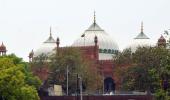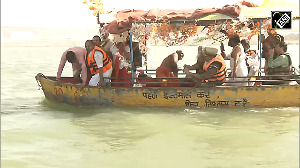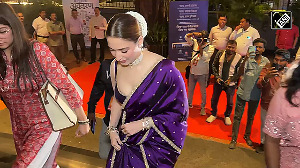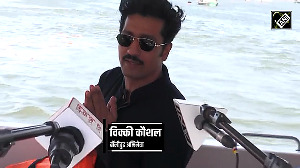The Supreme Court will on January 15 hear a plea of the mosque management committee against an order rejecting its petition in the Krishna Janmabhoomi-Shahi Idgah dispute in Mathura, Uttar Pradesh.

A single judge bench of the Allahabad high court on August 1, last year, rejected the plea of the committee of management, Trust Shahi Masjid Idgah, challenging the maintainability of 15 cases related to the temple-mosque dispute in Mathura, and ruled the religious character of Shahi Idgah needed to be determined.
A bench comprising Chief Justice Sanjiv Khanna and Justice Sanjay Kumar, on December 9, last year commenced the final hearing in the case and the matter is set to come up before the bench on January 15, according to the SC website.
One of the Hindu parties, represented by advocate Barun Sinha, had argued the mosque committee could have moved the Allahabad high court against the single judge's order over the dispute.
He said the plea of the mosque committee was not maintainable in the top court at the present stage.
The lawyer referred to the Allahabad high court rules and argued, "In view of Chapter 8 of the Allahabad high court rules, a special appeal before the division bench of the high court would be maintainable.
He said an appeal in the Supreme Court was not "maintainable against the order of a single judge bench of the high court" and an intra-court appeal in the high court should have been filed. The lawyer therefore sought the plea to be dismissed.
On November 29, last year, the CJI-led bench agreed to hear the plea.
"This we will hear at length. We will take it up on December 9, at 2 pm... We have to decide what is the legal position," the CJI said.
Speaking for the bench, the CJI prima facie felt that an intra-court appeal would lie against the single judge bench's August 1 order of the high court.
"We will certainly give you an opportunity to argue," the bench said.
The mosque committee said the suits filed by Hindu litigants over the dispute over the Krishna Janmabhoomi temple, and the adjoining mosque, violated the Places of Worship (Special Provisions) Act, and were therefore not maintainable.
The 1991 Act prohibits changing the religious character of any shrine from what existed on the day of the country's Independence.
The Ram Janmabhoomi-Babri Masjid dispute was however kept outside its purview.
The cases filed by the Hindu party side seek the removal of the Aurangzeb-era mosque, claiming it was built after the demolition of a temple that once stood there.
The high court said the 1991 Act did not define the term religious character and the "disputed" place couldn't have a dual religious character -- of a temple and a mosque, which are adverse to each other -- at the same time.
"Either the place is a temple or a mosque. Thus, I find that the religious character of the disputed place as it existed on August 15, 1947, is to be determined by documentary as well as oral evidence led by both the parties, the high court said.
The high court concluded the cases did "not appear to be barred by any provisions of the Wakf Act, 1995, the Places of Worship (Special Provisions) Act, 1991, the Specific Relief Act, 1963, the Limitation Act, 1963 and Order XIII Rule 3A of the Code of Civil Procedure Code, 1908".
Hindu side's advocate Vishnu Shankar Jain had said his client would move the Supreme Court for vacating its stay on a previous Allahabad high court order allowing the mosque's survey.
The mosque management committee and the UP Sunni Central Waqf Board argued the suits were barred under Places of Worship Act and other laws.
On May 31, 2024, the Allahabad high court reserved its judgment on the maintainability plea after hearing both sides.
But the court reopened the hearing at the request of Shahi Idgah counsel Mehmood Pracha.
The Mathura dispute mirrors the legal tussle in Varanasi, where the Gyanvapi mosque and the Kashi Vishwanath temple are located next to each other.











 © 2025
© 2025